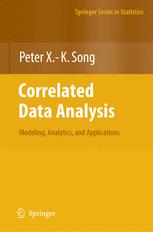

Most ebook files are in PDF format, so you can easily read them using various software such as Foxit Reader or directly on the Google Chrome browser.
Some ebook files are released by publishers in other formats such as .awz, .mobi, .epub, .fb2, etc. You may need to install specific software to read these formats on mobile/PC, such as Calibre.
Please read the tutorial at this link: https://ebookbell.com/faq
We offer FREE conversion to the popular formats you request; however, this may take some time. Therefore, right after payment, please email us, and we will try to provide the service as quickly as possible.
For some exceptional file formats or broken links (if any), please refrain from opening any disputes. Instead, email us first, and we will try to assist within a maximum of 6 hours.
EbookBell Team

0.0
0 reviewsThis book presents some recent developments in correlated data analysis. It utilizes the class of dispersion models as marginal components in the formulation of joint models for correlated data. This enables the book to handle a broader range of data types than those analyzed by traditional generalized linear models. One example is correlated angular data.
This book provides a systematic treatment for the topic of estimating functions. Under this framework, both generalized estimating equations (GEE) and quadratic inference functions (QIF) are studied as special cases. In addition to marginal models and mixed-effects models, this book covers topics on joint regression analysis based on Gaussian copulas and generalized state space models for longitudinal data from long time series.
Various real-world data examples, numerical illustrations and software usage tips are presented throughout the book. This book has evolved from lecture notes on longitudinal data analysis, and may be considered suitable as a textbook for a graduate course on correlated data analysis. This book is inclined more towards technical details regarding the underlying theory and methodology used in software-based applications. Therefore, the book will serve as a useful reference for those who want theoretical explanations to puzzles arising from data analyses or deeper understanding of underlying theory related to analyses.
Peter Song is Professor of Statistics in the Department of Statistics and Actuarial Science at the University of Waterloo. Professor Song has published various papers on the theory and modeling of correlated data analysis. He has held a visiting position at the University of Michigan School of Public Health (Ann Arbor, Michigan).